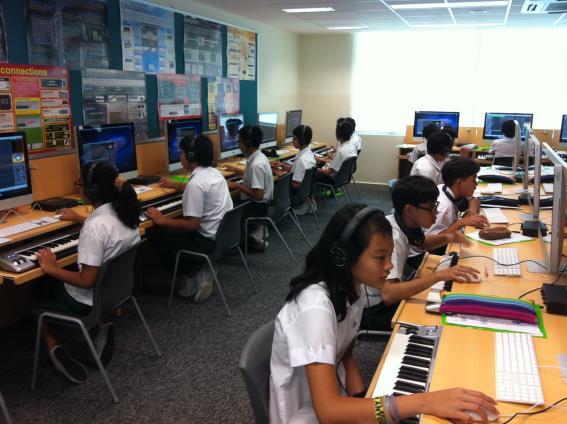
3 minute read
Music
Grade 7 and 8 Music
What is the nature of Music in Grades 7 and 8 Music?
Advertisement
A vibrant musical education fosters curiosity and openness to both familiar and unfamiliar musical worlds. Through learning and participating in the study of music we are able to explore the similarities, differences and links in music from within our own culture and that of others across time. At SJI International students’ learning and active musical engagement allows them to become informed, reflective and critical practitioners in music, to explore and value the diversity of the music across time, place and cultures and develop confidence and experience as a performer.
What is the approach to learning?
Students are required to develop musical skills and awareness through an integrated programme of listening, performing, appraising and composing. These practical activities aim to:
● Help students develop a perceptive, sensitive and critical response to the main historical periods and styles of Western Art music as well as the different genres and styles in music. ● Help students to recognize and understand the music of various non-Western traditions and thus to form an appreciation of cultural similarities and differences. ● Provide a foundation for the development of an informed appreciation of music. ● Provide a foundation for further study in music at IGCSE and IB levels. ● Have fun and develop and lifelong love for Music.
During the performance and composition components in the course, students will have opportunities to learn basic skills on keyboards, guitar, ukulele and various drumming and percussion instruments (including an ensemble performance unit on Indonesian Gamelan) as well as class singing. In Grade 7 and 8 Music, students will also explore Music Technology with access to one of the most comprehensive Music Technology facilities in Singapore and using programs such as GarageBand, Sibelius and Logic Pro.
What is the Subject Content?
Students will follow a curriculum which teaches different units through the elements of music; Texture, Timbre, Rhythm, Melody, Harmony, and finally Form and Structure. These units extend from skills learnt in Grade 6 and focuses on the skills and knowledge required for IGCSE Music. Through the exploration of different musical elements, G7 and 8 Music, is divided into the following four basic components:
Focused Listening, Performing, Composing Knowledge and Understanding.
and
Learning Activities include:

● Performing on a range of instruments, including singing and other vocal expressions, individually, in small and large groups, in unison and in parts, to demonstrate control of technique through articulation, phrasing and dynamics. ● Composing from a range of stimuli, using a range of resources including
Music Technology, developing ideas with improvisation, experimentation
including electronic sound. Appraising recorded and own performances using musical language to demonstrate listening skills and understanding of music conventions and processes.
Grade 7 Music Units
Film Music –Keyboard performance, Music Technology composition, class Singing, focused listening
African Drumming –Djembe and percussion ensemble performance, rhythmic composition including African Marimbas and percussion, focused listening
Blues and Jazz Improvisation –Group performance (band instruments), lyric writing, Improvisation and focused listening
4 Chord Song –Ukulele ensemble performance,collaborative arrangement/composition, focused listening, class singing
SHOWCASE - November
Free Composition –Response to Stimuli, (Instrumental or Music Technology composition)
Grade 8 Music Units
Samba Drumming –Samba Drumming class and small group performance, focused listening, rhythmic improvisation
Minimalism –Tuned percussion and midi instrument group performance, individual/group composition, focused listening
Gamelan –(3 weeks) Class ensemble performance workshops
4 Chord Song –Band instrument group performance, group composition, focused listening, class singing
SHOWCASE - November
Free Composition –Response to Stimuli , (Instrumental or Music Technology composition)
What is the nature of assessment?
The junior music curriculum assesses students in the following four components;
Students will be self and peer assessed during all projects, with formative and summative assessment taking place by the teacher. They will be assessed against common standards, and learn how to move up to the next level. Homework will be assessed in a variety of ways –sometimes with comments on how to improve and what has been successful, sometimes a grade, again supported by comments. Also throughout the year, in line with assessments from all subjects, parents will receive regular assessment grades on Teamie showing students attainment and progress throughout the year.
Students in art will be assessed on 4 criteria within their work:
-Knowledge and Understanding -Thinking Creatively -Developing Skills -Reflection and response
Within each criteria there are different standards, so students will receive feedback on each individual standard so they know how to make progress in future projects.



